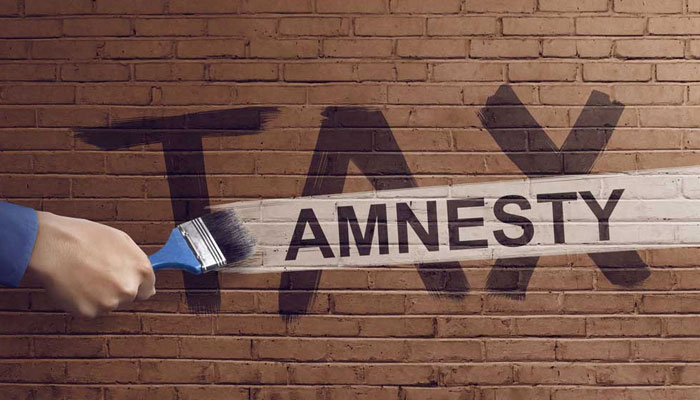Jang Economic Session: ‘Take all stakeholders on board after amnesty scheme’
LAHORE: The government needed to take all stakeholders on board after amnesty scheme and create harmony among the taxpayers and collectors, besides ending uncertainty and harassment environment in the country that is affecting both public and economy.
These views were expressed by the experts in the Jang Economic Session on ‘Industry and Trade opinion about FBR action after Amnesty Scheme’. The panellists were Ansar Javeed, Javeria Qais, Sohail Lashari, Munir Ahmed Khan, Zeeshan Khalil, Riffat Malik and Waqar Ahmed Mian. The session was hosted by Sikandar Lodhi.
Ansar Javeed said that amnesty aimed at bringing the informal sector into formal sector and increasing revenue collection while developing countries’ economies were under huge pressure and the amnesty scheme could be helpful in satisfying the international institutions. He said Pakistan gave highest amnesties in South Asia but failed to achieve required results. He said political slogans could not resolve economic issues, instead the government should take all stakeholders on board for resolving the issues. He suggested discouraging smuggling and narcotics which would support informal economy. He believed that good environment was available for creation of tax culture so taxation procedures should be made easy, besides educating the tax officers in accordance with international standards.
Javeria Qais said that action against undeclared assets seemed to be successful after amnesty scheme and no doubt economy was put on modern formal economy. She said over 100,000 new registrations under amnesty scheme was a success.
Sohail Lashari said that five years tax holidays should be given to the industry through an industrial amnesty scheme besides whitening of assets through amnesty scheme and reducing the size of informal economy.
Munir Ahmed Khan said if the government did not take immediate action against undeclared assets amnesty scheme would become a joke. However, he said Imran Khan could implement strict decisions. He said tax collection always remained failure while there was a need to discourage tax evasion culture. He demanded the FBR take strict action for ensuring 100 percent tax collections and government officials promote tax culture to achieve better results.
Zeeshan Khalil said amnesty scheme always proved a blessing for public but the government should create awareness about its benefits before launching it for maximum results. He said step wise implementation of amnesty scheme could get better results so far. He said due to illiteracy public was unaware of the benefits of amnesty schemes. He demanded the government take notice of rumours about checking bank lockers as such rumours would create mistrust and panic among people.
Riffat Malik said that prime minister and ministers should voluntarily reduce their expenses in ongoing economic situation. She said people had become strangers in own country while growing problems of businesses were moving the country towards socialism which would not produce positive results. She called for separating business from politics, appointing right person on seats, and ensuring business and employment to educated people to resolve socio-economic issues. She suggested ensuring middle class representation in government machinery for correct decisions.
Waqar Ahmed Mian said allegations of tax evasion on business community were not 100 percent correct. He said business community wanted to pay taxes but FBR did not want to collect it. He called for positive role of tax collecting agencies in tax collection. He said business community was disturbed due to withholding tax regime which resulted in establishment of cash, parchi, and hundi system and affected the banking system. He called for discouraging black money.
-
 Pamela Anderson, David Hasselhoff's Return To Reimagined Version Of 'Baywatch' Confirmed By Star
Pamela Anderson, David Hasselhoff's Return To Reimagined Version Of 'Baywatch' Confirmed By Star -
 Willie Colón, Salsa Legend, Dies At 75
Willie Colón, Salsa Legend, Dies At 75 -
 Prince Edward Praised After Andrew's Arrest: 'Scandal-free Brother'
Prince Edward Praised After Andrew's Arrest: 'Scandal-free Brother' -
 Shawn Levy Recalls Learning Key Comedy Tactic In 'The Pink Panther'
Shawn Levy Recalls Learning Key Comedy Tactic In 'The Pink Panther' -
 King Charles Fears More Trouble As Monarchy Faces Growing Pressure
King Charles Fears More Trouble As Monarchy Faces Growing Pressure -
 Inside Channing Tatum's Red Carpet Return After Shoulder Surgery
Inside Channing Tatum's Red Carpet Return After Shoulder Surgery -
 Ryan Coogler Brands 'When Harry Met Sally' His Most Favourite Rom Com While Discussing Love For Verstality
Ryan Coogler Brands 'When Harry Met Sally' His Most Favourite Rom Com While Discussing Love For Verstality -
 Sarah Pidgeon Explains Key To Portraying Carolyn Bessette Kennedy
Sarah Pidgeon Explains Key To Portraying Carolyn Bessette Kennedy -
 Justin Bieber Rocked The World With Bold Move 15 Years Ago
Justin Bieber Rocked The World With Bold Move 15 Years Ago -
 Sam Levinson Wins Hearts With Huge Donation To Eric Dane GoFundMe
Sam Levinson Wins Hearts With Huge Donation To Eric Dane GoFundMe -
 Kate Middleton Steps Out First Time Since Andrew Mountbatten-Windsor's Arrest
Kate Middleton Steps Out First Time Since Andrew Mountbatten-Windsor's Arrest -
 Inside Nicole 'Snooki' Polizzi's 'private' Marriage With Husband Jionni LaValle Amid Health Scare
Inside Nicole 'Snooki' Polizzi's 'private' Marriage With Husband Jionni LaValle Amid Health Scare -
 Germany’s Ruling Coalition Backs Social Media Ban For Children Under 14
Germany’s Ruling Coalition Backs Social Media Ban For Children Under 14 -
 Meghan Markle Shuts Down Harry’s Hopes Of Reconnecting With ‘disgraced’ Uncle
Meghan Markle Shuts Down Harry’s Hopes Of Reconnecting With ‘disgraced’ Uncle -
 Liza Minnelli Alleges She Was Ordered To Use Wheelchair At 2022 Academy Awards
Liza Minnelli Alleges She Was Ordered To Use Wheelchair At 2022 Academy Awards -
 Quinton Aaron Reveals Why He Does Not Want To Speak To Wife Margarita Ever Again
Quinton Aaron Reveals Why He Does Not Want To Speak To Wife Margarita Ever Again




